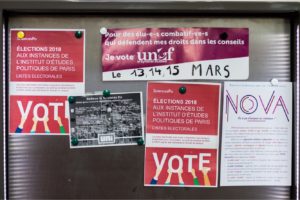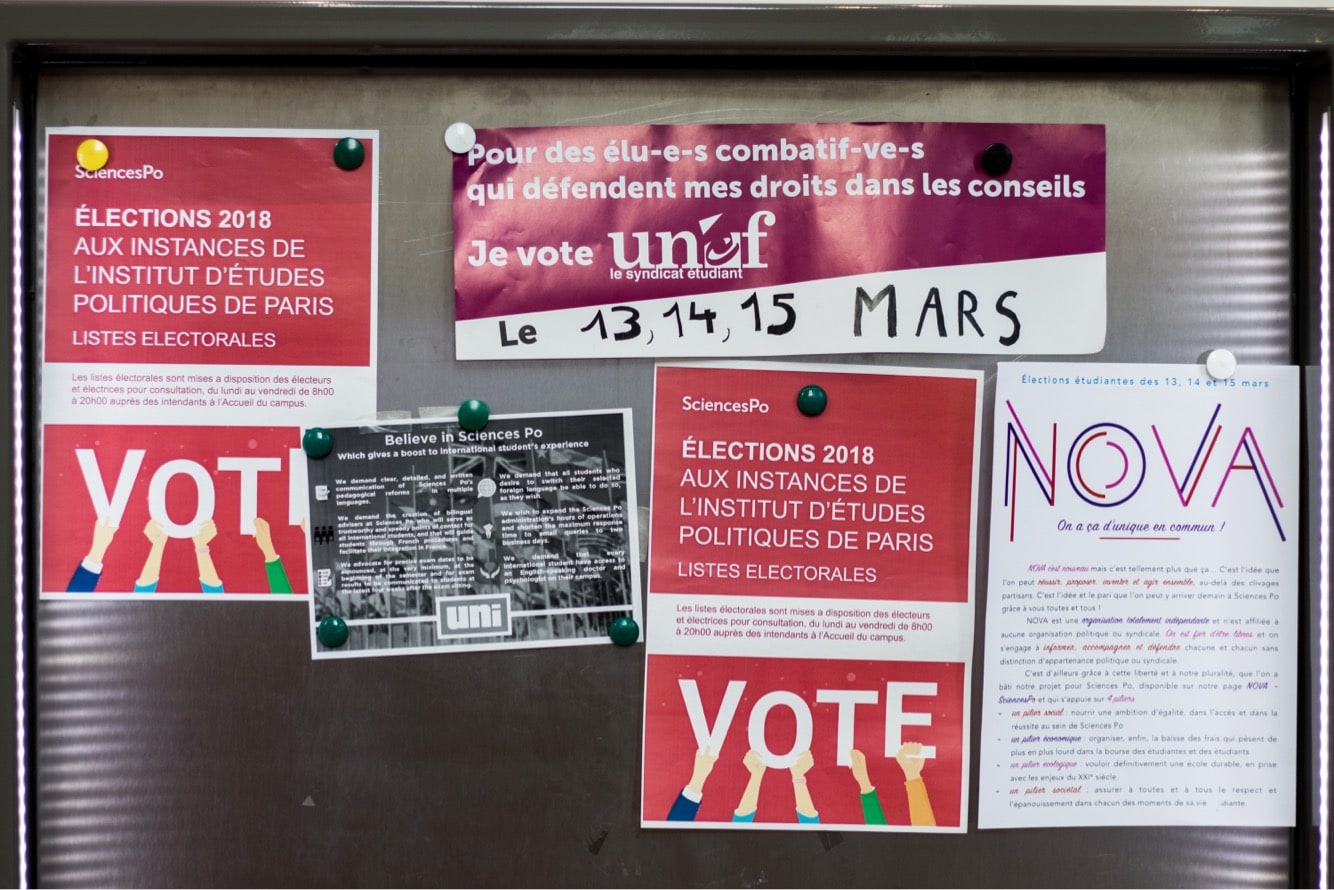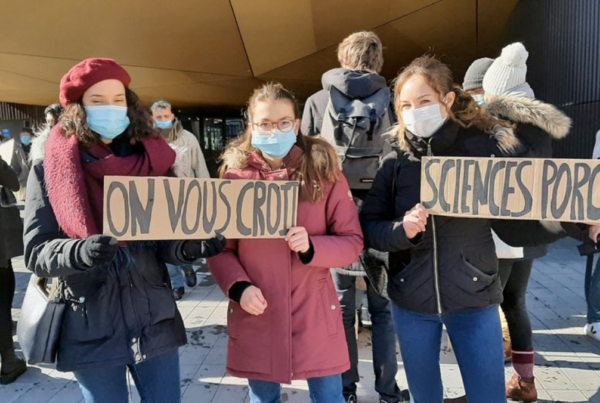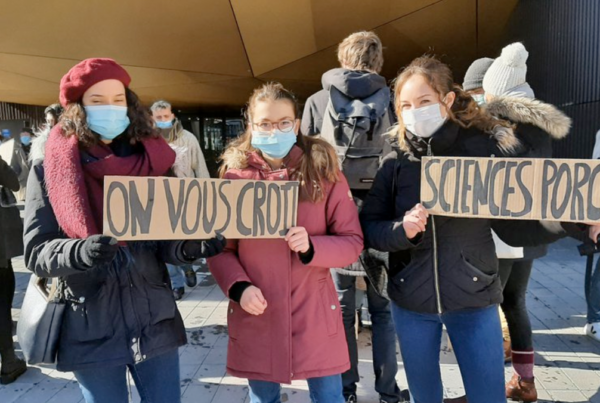By Jacob Hartley

Photo: Krystof Stupka// The Sundial Press
Social media comment wars, poster defamation, and debates among students about the true values of the two largest student union groups have sparked questions over the history of these two major factions vying to represent the students of not just the Reims campus, but all of the Sciences Po campuses. According to an email from the campaign arm of Sciences Po, students will vote for representatives to the Board of Directors of the Fondation Nationale des Sciences Politiques and the three boards of the Institut d’études politiques de Paris, namely the Institute’s Board of Directors, the Academic Board and the Student Life and Education Committee.
There are four unions in total vying for students’ votes this election cycle. The two largest contenders, UNI (Union nationale interuniversitaire) and UNEF (L’Union nationale des étudiants de France), are competing with two smaller unions, Solidaires-Étudiant-e-s and NOVA. Solidaires is known for taking very progressive positions, such as advocating for the rights of migrants and “no borders”, prohibiting “far right” speakers on campus to speak, proposing more racially and gender inclusive readings for students, and promoting organizations that also wish to be more inclusive. NOVA stands for “a concrete evolution” of the CEP admission procedure, the method for applying to dual degree programs, along with the addition of Chinese and Russian languages to the curriculum and longer library operation hours.
Yet, the conversation has largely been focused on the two major unions, leaving little room for the two minor unions to make waves. Students have been closely following the ongoing controversy surrounding past anti-gay marriage decisions starting in 2012 from UNI, the second largest union. The national UNI party, in 2013, took an official position against the proposed law. Since then, there have been differing opinions within its ranks about this issue, leaving UNI candidates like Euram 2A Caroline Rice to diverge from the national party’s official opinion.
Rice explained that the platform she and other members of the UNI list are running on is far-reaching, including a commitment to regional campuses, stating that “there’s a large student body here and we know that the administration is all too often super Parisian-centered.” Rice commented that “we want to make sure that everyone has an equal shot at getting into Sciences Po in the first place” by implementing tuition hike regulations that “do not surpass the inflation rate.”
Her party is also committing itself to the “new reform” by pushing for “clear, detailed, and written communication about the Acte II reforms, in both English and French.” According to Rice, UNI is “committed to our international students” and envisions “the hiring of a permanent advisor to international students,” echoing calls from international students on campus who often find themselves in unfamiliar situations with French bureaucracy.
When asked about the recent controversy regarding UNI anti-gay marriage statements, Rice said “we understand that it was jarring for the student body to discover out of the blue that the national UNI had taken a stance against gay marriage” but added that her list “truly understands the concerns raised this past week about LGBTQ rights.” The President of UNI made a statement on the controversy last week, and Rice echoed her comments noting that “as Amine (President of UNI Sciences Po) said, many changes have already occurred, and we fully intend to continue on that route” but that this will “take time.” Rice emphasized that UNI’s Sciences Po chapter has committed itself to “fight for equality of access to Sciences Po and equality at Sciences Po, regardless of sexual orientation, gender, disability, or home country.”
The conflict between the two largest unions, however, does not end here. UNEF, the other major union participating in the election, is a self-described “progressive union” according to candidate and Euram 2A Anton Mukhamedov, meaning they “fight for equal rights and equal chances.” UNEF’s platform, according to Mukhamedov, is composed of promises “to ensure that tuition fees do not rise, that international students are integrated into the brackets system and don’t have to pay maximum fee, that each program’s specificities are preserved (especially when it comes to the Euro-African program on this campus, which some students say is losing its essence), that the budget dedicated for health is increased, that we live in a ‘greener’ school that explicitly commits to divesting from fossil fuels, recycling and reducing emissions, and last but not least, that the campus is welcoming to all the students and prohibits all forms of discrimination…”
Turning the attention to the ongoing debate regarding homophobia, Mukhamedov believes that his union helps lead the “fight against homophobia and transphobia is the fight of our union as a whole, as well as of its individual members” and that UNEF “is unapologetically supportive of same sex marriage and adoption.” Mukhamedov brought up the issue involving Sens Commun, a group that is known for its rigid anti-gay beliefs and has campaigned against gay marriage in the past. He added that UNEF has been “vigilant as to the appearance of reactionary groups” and has also made a point to show public disdain for groups such as Sens Commun by issuing a statement declaring its disapproval of the controversial groups’ recognition at Sciences Po. Solidaires, a minor student union, also was a signatory to this document.
But there are indeed waves rocking the highest levels of UNEF, as an article in Libération this past February gave a detailed recount of women who were “long silent” and told the paper of “the union and its apparent laissez-faire (approach) to sexual violence.” The paper “collected the testimonies of sixteen women victims of harassment, sexual assault and rape by leaders of the student organization between 2007 and 2015” and includes graphic testimony of the predatory actions taken by former senior leaders of UNEF.
When asked about this article, Mukhamedov responded, stating that the new president of UNEF, Maguelone Vivès, is “incredibly invested in fighting sexism and sexual violence–such as non-mixed meetings allowing women to speak freely about all problematic incidents they have faced.” How these cases are being handled both internally and at the legal level was a question Mukhamedov was unable to answer, but he noted that these issues “are dealt with at the legal level” and later referred to a response sent to him by Vivès.
Vivès, in her statement to The Sundial Press, confirmed that “the women of the union are accompanied by people trained in the union who advise them a lawyer, a safe police station where to file a complaint and psychological help.” She stated that while UNEF does “accompany” the victims throughout the legal process, after the legal process is complete “we also make sure that the abuser is removed from the union and is no longer part of the social circle of the victim.” She did not go into detail on how the organization would expel people from their former social groups, a seemingly impossible task given this is outside of a student political union’s realm of authority. Vivès, as mentioned, is seen by many within her union as a break in a long tradition of unreported and ignored crimes that trickled down from the UNEF senior leadership into the campus levels. Even still, both unions are battling concerns from the highest levels of governance, leaving students questioning which side to take in the ongoing elections.
Both UNI and UNEF will have to continue to separate themselves from their troubled pasts if they hope to emerge victorious in this upcoming election. Voting will take place from 9:00 a.m. Tuesday to 5 p.m. Thursday.
Editor’s note: Anton Mukhamedov is the editor in chief of The Sundial Press responsible for multimedia. He was not involved in the editing and publication of this article.
Other posts that may interest you:
- The Trouble with ‘Ecocide’
- Carbon dioxide removal – hit or miss?
- Local Victories for Turkish Opposition — A Sign of Hope?
- Are France and Japan a Mismatch Made in Heaven?
- A Reflection on Dark Tourism
Discover more from The Sundial Press
Subscribe to get the latest posts sent to your email.





